盘点平常用英文容易翻译错的25个句子
英语易错译句子有哪些

英语易错译句子有哪些英语易错译句子1. It is two years since I smoked.误:我抽烟已经两年了。
正:我戒烟已经两年了。
析:在 It is +时间段+ since 从句中,若表示时间的 since 从句中的谓语动词是持续性动词,则这个时间段是从这个持续性动作结束时算起。
如: It is ten years since she was here. 她不在这里已经十年了。
2. All of us are not for the plan.误:我们大家都不赞成这个计划。
正:并非我们大家都赞成这个计划。
析: all/both/everything 等用于否定结构时不表示全部否定,而表示部分否定。
如: Not both of them are right. (并非他们两人都是对的。
)又如:She doesnt like everything here. (她并非喜欢这里的一切。
)3. We cant be too careful in doing such experiments.误:做这样的实验,我们不能太仔细。
正:做这样的实验,我们必须非常非常仔细。
析: can nottoo 句式表示无论怎样也不过分、越越好。
如: We can not estimate1 the value of modern science too much. (对于现代科学的价值,我们无论作怎样的评价也不算过分。
)4. She isnt hungry a little.误:她一点也不饿。
正:她非常饿。
析: not a little 意为很、非常。
not a bit 和 not in the least 则意为一点也不。
如: She isnt hungry a bit. (她一点也不饿。
)5. The man is too strong not to lift the box up.误:这个人力气不够大,不能把这只箱子提起来。
英语翻译易错语句

英语翻译易错语句(总21页) -CAL-FENGHAI.-(YICAI)-Company One1-CAL-本页仅作为文档封面,使用请直接删除1. Nobody will be the wiser.谁也不会更为聪明。
(误)谁也不懂得。
(正)注:英语形容词wise 有三个基本意思:(1) 聪明的,如You were wise not to go.(你不去是聪明的)。
(2) 饱学的,如 He is wise in the law.(他精通法律)。
(3)知道的,如 We are none the wiser for his explanations.(听完他的解释,我们还是不明白)。
上例便是第三义,等于说 Nobody will know it. 通常比较级,意为“至今不知道的事,现在知道了”,所谓none the wiser= no wiser than before= as wise as before,照旧。
2.Don't you see the writing on the wall?你看不见墙上的字吗(误)难道你看不到灾难的迫切吗(正)注:The writing on the wall (or sometimes 'handwriting on the wall') is an expression that suggests a portent of doom or misfortune. It originates in the Biblical book of Daniel - where supernatural writing fortells the demise of the Babylonian Empire, but it has come to have a wide usage in language and literature.3.Truth lies at the bottom of the decanter.真相从玻璃酒瓶地下看出来。
英译汉易错句子
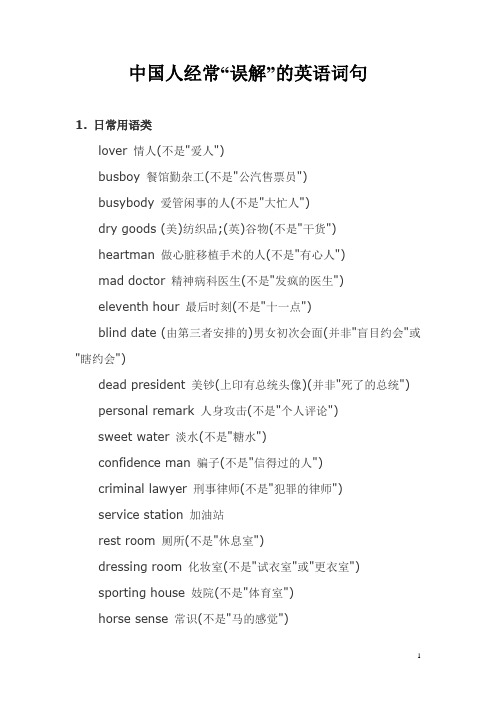
中国人经常“误解”的英语词句1. 日常用语类lover 情人(不是"爱人")busboy 餐馆勤杂工(不是"公汽售票员")busybody 爱管闲事的人(不是"大忙人")dry goods (美)纺织品;(英)谷物(不是"干货")heartman 做心脏移植手术的人(不是"有心人")mad doctor 精神病科医生(不是"发疯的医生")eleventh hour 最后时刻(不是"十一点")blind date (由第三者安排的)男女初次会面(并非"盲目约会"或"瞎约会")dead president 美钞(上印有总统头像)(并非"死了的总统") personal remark 人身攻击(不是"个人评论")sweet water 淡水(不是"糖水")confidence man 骗子(不是"信得过的人")criminal lawyer 刑事律师(不是"犯罪的律师")service station 加油站rest room 厕所(不是"休息室")dressing room 化妆室(不是"试衣室"或"更衣室")sporting house 妓院(不是"体育室")horse sense 常识(不是"马的感觉")capital idea 好主意(不是"资本主义思想")familiar talk 庸俗的交谈(不是"熟悉的谈话")black tea 红茶(不是"黑茶")black art 妖术(不是"黑色艺术")black stranger 完全陌生的人(不是"陌生的黑人")white coal (作动力来源用的)水white man 忠实可靠的人(不是"皮肤白的人")yellow book 黄皮书(法国政府报告书,以黄纸为封)(不是"黄色书籍")red tape 官僚习气(不是"红色带子")green hand 新手(不是"绿手")blue stocking 女学者、女才子(不是"蓝色长统袜")China policy 对华政策(不是"中国政策")Chinese dragon 麒麟(不是"中国龙")American beauty 红蔷薇(不是"美国美女")English disease 气管炎(不是"英国病")Indian summer 愉快宁静的晚年(不是"印度的夏日")Greek gift 害人的礼品(不是"希腊礼物")Spanish athlete 吹牛的人(不是"西班牙运动员")French chalk 滑石粉(不是"法国粉笔")2. 表达方式类Look out! 当心!(不是"向外看")What a shame! 多可惜!真遗憾!(不是"多可耻")You don't say! 是吗!(不是"你别说")You can say that again! 说得好!(不是"你可以再说一遍")I haven't slept better. 我睡得好极了。
英语句子中最容易翻译错的语句
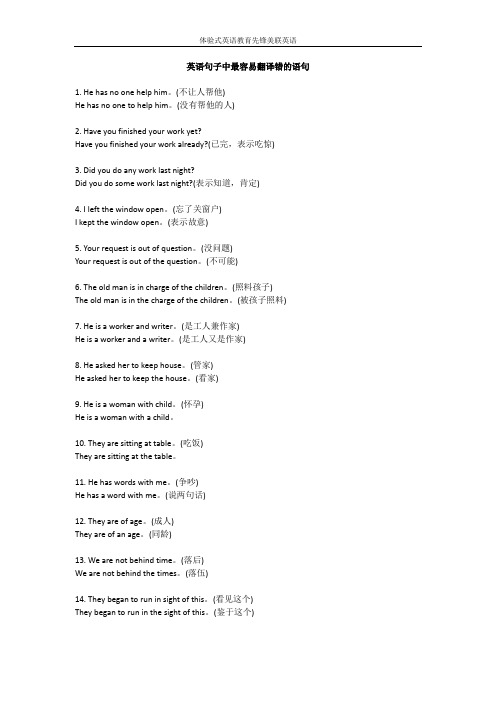
英语句子中最容易翻译错的语句1. He has no one help him。
(不让人帮他)He has no one to help him。
(没有帮他的人)2. Have you finished your work yet?Have you finished your work already?(已完,表示吃惊)3. Did you do any work last night?Did you do some work last night?(表示知道,肯定)4. I left the window open。
(忘了关窗户)I kept the window open。
(表示故意)5. Your request is out of question。
(没问题)Your request is out of the question。
(不可能)6. The old man is in charge of the children。
(照料孩子)The old man is in the charge of the children。
(被孩子照料)7. He is a worker and writer。
(是工人兼作家)He is a worker and a writer。
(是工人又是作家)8. He asked her to keep house。
(管家)He asked her to keep the house。
(看家)9. He is a woman with child。
(怀孕)He is a woman with a child。
10. They are sitting at table。
(吃饭)They are sitting at the table。
11. He has words with me。
(争吵)He has a word with me。
(说两句话)12. They are of age。
新汉译英最易翻错的100句
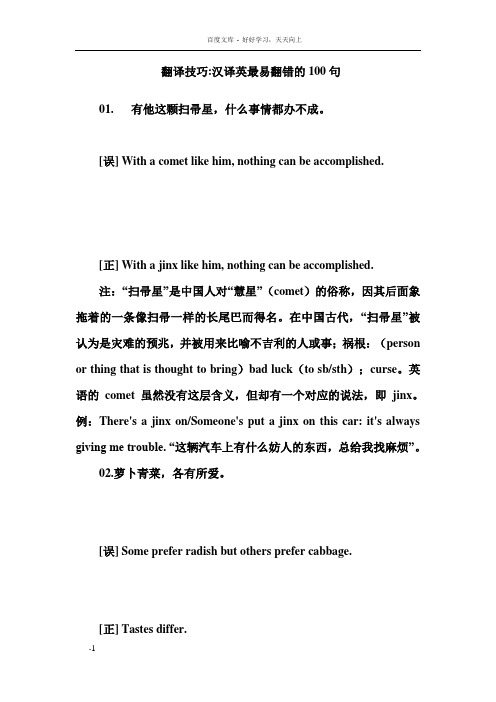
翻译技巧:汉译英最易翻错的100句01. 有他这颗扫帚星,什么事情都办不成。
[误] With a comet like him, nothing can be accomplished.[正] With a jinx like him, nothing can be accomplished.注:“扫帚星”是中国人对“慧星”(comet)的俗称,因其后面象拖着的一条像扫帚一样的长尾巴而得名。
在中国古代,“扫帚星”被认为是灾难的预兆,并被用来比喻不吉利的人或事;祸根:(person or thing that is thought to bring)bad luck(to sb/sth);curse。
英语的comet 虽然没有这层含义,但却有一个对应的说法,即jinx。
例:There's a jinx on/Someone's put a jinx on this car: it's always giving me trouble. “这辆汽车上有什么妨人的东西,总给我找麻烦”。
02.萝卜青菜,各有所爱。
[误] Some prefer radish but others prefer cabbage.[正] Tastes differ.注:Tastes differ/vary 是句英语谚语,除此以外,原句还可翻译成No dish suits all tastes 或You can never make everyone happy 等。
《新概念英语》第三册第23课的标题是:One man's meat is another man's poison,表达的很生动。
总之,应采取意译。
03.他一向嘴硬,从不认错。
[误] He has always got a hard mouth and never admit a fault.[正] He never says uncle.注:say (cry) uncle: to give up or in; to surrender; to admit defeat. Mainly used by boys, as when fighting。
24句容易误译的英语

容易误译的英语(24句)1、We wont to smoke cigarettes before sleep.[误译] 我们不愿睡前抽烟.[原意] 我们习惯于睡前抽烟.[说明] 句中的wont不是won’t(will not),而是不及物动词,意为"习惯","惯常".可见,连小至一个逗点都不能忽视,否则就会误译罗2、Why is Victor walking on air?[误译] Victor 为什么在腾云驾雾?[原意] Victor 为什么兴高采烈?[说明] walk on air,为俗语,意为“兴高采烈”,"得意洋洋"。
3、Kirk never has words with his neighbours.[误译] Kirk从不与他的邻居说话.[原意] Kirk从不与他的邻居中吵嘴.[说明] have words with sb 是习惯用语,意为与某人吵嘴;have a word with sb 才是与某人说话的意思.4、Rebecca is a woman of the town(street).[误译] Rebecca是个城市妇女。
[原意] Rebecca是个娼妓。
[说明] woman of the town(street)是习语,意思“娼妓”。
5、He did business without return.[误译] 他去做生意没有回来。
[原意] 他做生意没赚到钱。
[说明] without return 意为“赚不到钱”,“无利可图”。
6、Arden appears to be no wiser than before.[误译] Arden 看起来不比以前聪明。
[原意] Arden 仍然不懂。
考试大(www.Examda。
com)[说明] 本例中的wise(adj)意为“知道了以前所不知道的事情”作此解时一般以比较级形式出现。
生活中英语翻译错误的例子
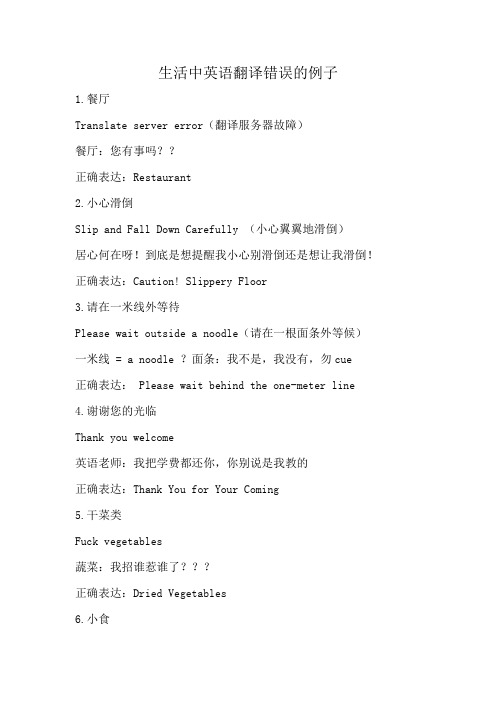
生活中英语翻译错误的例子
1.餐厅
Translate server error(翻译服务器故障)
餐厅:您有事吗??
正确表达:Restaurant
2.小心滑倒
Slip and Fall Down Carefully (小心翼翼地滑倒)
居心何在呀!到底是想提醒我小心别滑倒还是想让我滑倒!正确表达:Caution! Slippery Floor
3.请在一米线外等待
Please wait outside a noodle(请在一根面条外等候)一米线 = a noodle ?面条:我不是,我没有,勿cue
正确表达: Please wait behind the one-meter line
4.谢谢您的光临
Thank you welcome
英语老师:我把学费都还你,你别说是我教的
正确表达:Thank You for Your Coming
5.干菜类
Fuck vegetables
蔬菜:我招谁惹谁了
正确表达:Dried Vegetables
6.小食
Small food(小的食物)
small:跟我有什么关系啊,别来沾边正确表达:Snacks。
盘点平常用英文容易翻译错的16个句子

盘点平常用英文容易翻译错的16个句子由于中外文化的差异,我们在学英语时的一直有直译习惯,导致出现一些常用的英文容易翻译错,翻译出来的单词和句子跟英文本身的含义大相径庭,我们一起来感受一下吧!英语中有很多用法,如果照字面意思翻译,译文会与实际含义存在差异,甚至大相径庭。
所以掌握这些特殊用法,也是英语学习的重要一课。
特别是下面这些常见特殊用法,不妨测试一下,看看自己有没有用错?1.It's a good father that knows his son.误:了解自己儿子的父亲都是好父亲。
正:好父亲也未必了解自己的儿子。
2.I have no opinion of that sort of man.误:我对那种人没有想法。
正:我对那种人没有好感。
3.Do you have a family?误:你有家人吗?正:你有儿女吗?4.What a shame!误:太可耻了!正:太遗憾了!5.You can say that again!误:你可以再说一次!正:说得好太对了!6.I haven't slept better.误:我睡的不怎么好。
正:我睡得好极了。
(我从未睡过这么好的觉。
)7.You can't be too careful in your work.误:你工作时不能太细心。
正:你工作时越细心越好。
8.It has been4years since I smoked.误:我抽烟有4年了。
正:我戒烟有4年了。
9.England is not agreeing with her.误:英国不同意/欢迎她。
正:她在英国水土不服。
10.You really flatter me.误:你一定在奉承我。
正:你让我受宠若惊。
11.You cannot give him too much money.误:你不能给他太多钱。
正:你给他再多的钱也不算多.12.You look darker after the holiday.误:假期之后你变黑了。
最容易被误解的54个英语句子
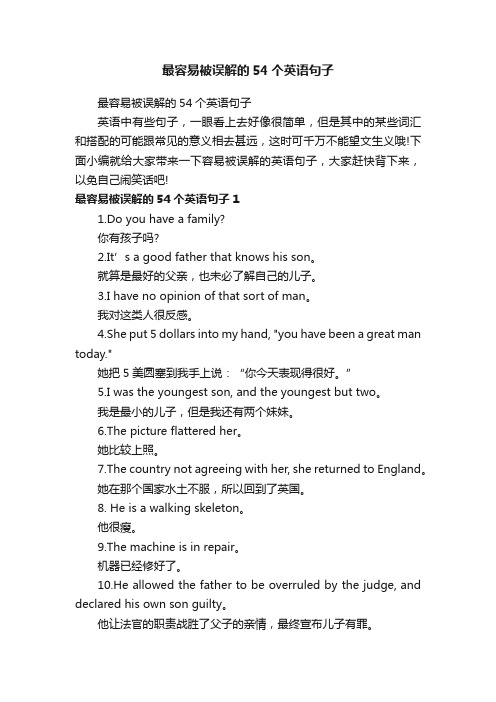
最容易被误解的54个英语句子最容易被误解的54个英语句子英语中有些句子,一眼看上去好像很简单,但是其中的某些词汇和搭配的可能跟常见的意义相去甚远,这时可千万不能望文生义哦!下面小编就给大家带来一下容易被误解的英语句子,大家赶快背下来,以免自己闹笑话吧!最容易被误解的54个英语句子11.Do you have a family?你有孩子吗?2.It’s a good father that knows his son。
就算是最好的父亲,也未必了解自己的儿子。
3.I have no opinion of that sort of man。
我对这类人很反感。
4.She put 5 dollars into my hand, "you have been a great man today."她把5美圆塞到我手上说:“你今天表现得很好。
”5.I was the youngest son, and the youngest but two。
我是最小的儿子,但是我还有两个妹妹。
6.The picture flattered her。
她比较上照。
7.The country not agreeing with her, she returned to England。
她在那个国家水土不服,所以回到了英国。
8. He is a walking skeleton。
他很瘦。
9.The machine is in repair。
机器已经修好了。
10.He allowed the father to be overruled by the judge, and declared his own son guilty。
他让法官的职责战胜了父子的亲情,最终宣布儿子有罪。
11.You don’t know what you are talking about。
你在胡说八道。
12.You don’t begin to understand what they mean。
24个极容易翻译错误的句子

容易翻译错误的几个句子..2009-03-11 15:331.Do you have a family?正确译文:你有孩子吗?2.It's a good father that knows his son.就算是最好的父亲,也未必了解自己的儿子.3.I have no opinion of that sort of man.我对这类人很反感.4.She put 5 dollars into my hand,"you have been a great man today."她把5美圆塞到我手上说:"你今天表现得很好."5.I was the youngest son, and the youngest but two.我是最小的儿子,但是我还有两个妹妹.6.The picture flattered her.她比较上照.7.The country not agreeing with her, she returned to England.她杂那个国家水土不服,所以回到了英国.8. He is a walking skeleton.他很瘦.9.The machine is in repair.机器已经修好了.10.He allowed the father to be overruled by the judge, and declared his own son guilty.他让法官的职责战胜了父子的亲情,最终宣布儿子有罪.11.You don't know what you are talking about.你在胡说八道.12.You don't begin to understand what they mean.你根本不知道他们在干嘛. don't begin :决不13.They didn't praise him slightly.他们大大地表扬了他.14.That's all I want to hear.我已经听够了.15.I wish I could bring you to see my point.你要我怎么说你才能明白呢.16.You really flatter me.你让我受宠若惊.17.He made a great difference.有他没他结果完全不一样.18.You cannot give him too much money.你给他再多的钱也不算多.19.The long exhausting trip proved too much.这次旅行矿日持久,我们都累倒了.20.The monk is only not a dead man.这个和尚虽然活着,但跟死了差不多.21.A surgeon made a cut in the patient's stomach.外科医生在病人胃部打了个洞.22.You look darker after the holiday.你看上去更健康了.23.As luck would have it, he was caught by the teacher again. 不幸的是,他又一次被老师逮个正着.24.She held the little boy by the right hand.。
最容易翻译错的二十五个汉语句子

蓝天外语编者按:以下列举的25个汉译英的错句,大多数的错误是比较初级的,有英语基础的人基本不会犯的。
也有一些是很多英语专业的同学都会犯的中国式英语错误。
最容易翻译错的25个汉语句子1. 你是做什么工作的呢?免费预约试听:/yuyue/ 点击进入八大校区选择。
False: What’s your job?True: Are you working at the moment?what’s your job这种说法难道也有毛病吗?是的。
因为如果您的谈话对象刚刚失业,如此直接的问法会让对方有失面子,所以您要问:目前您是在上班吗,Are you working at the moment,接下来您才问:目前您在哪儿工作呢,where are you working these days,或者您从事哪个行业呢,What line of work are you in,顺带说一下,回答这类问题时不妨说得具体一点,不要只是说经理或者秘书。
2. 我很喜欢它。
False: I very like it.True: I like it very much.3 这个价格对我挺合适的。
False: The price is very suitable for me.True: The price is right.suitable(合适的、相配的)最常见的用法是以否定的形式出现在告示或通知上,如:下列节目儿童不宜。
The following programme is not suitable for children在这组句子中用后面的说法会更合适。
4. 用英语怎么说?False: How to say in English?True: How do you say this in English?How to say是在中国最为泛滥成灾的中国式英语之一,这决不是地道的英语说法。
同样的句子有:请问这个词如何拼写,How do you spell that please,请问这个单词怎么读,How do youpronounce this word。
容易误解的英语句子大全

容易误解的英语句子大全1. The house is really A-1.(误译)那间房子的门牌确实是A-1号。
(正译)那间房子确实是一流的。
2.He bought a baker's dozen of biscuits.(误译)他买了面包师做的12块饼干。
(正译)他买了13块饼干。
3.A bull of Bashan woke the sleeping child with his noise. (误译)贝兴的一头公牛弄醒了那个酣睡的孩子。
(正译)一个大嗓门的人把那个酣睡的孩子吵醒了。
4.He was a cat in the pan.(误译)他是盘子中的一只猫。
(正译)他是个叛徒。
5.A cat may look at a king.(误译)一只猫都可以看到国王。
(正译)小人物也该有同等权利。
6.Even a hair of dog didn't make him feel better.(误译)即使一根狗毛也不会使他觉得好些。
(正译)即使是再喝解宿醉的一杯酒,也不会使他觉得好些。
7.Is he a Jonah?(误译)他就是叫约拿吗?(正译)他是带来厄运的人吗?8.Jim is fond of a leap in the dark.(误译)吉姆喜欢在黑暗处跳跃。
(正译)吉姆喜欢冒险行事。
9.A little bird told me the news.(误译)一只小鸟将此消息告诉我。
(正译)消息灵通的人士将此消息告诉我。
10.Angela is a man of a woman.(误译)安吉拉是个有妇之夫。
(正译)安吉拉是个像男人的女人。
11.Nellie is a man of his word.(误译)内莉是他所说的那个人。
(正译)内莉是个守信用的人。
12.He paid a matter of 1000 yuan.(误译)他付了1000元的货物账。
(正译)他大约付了1000元。
英语易错译句子有哪些
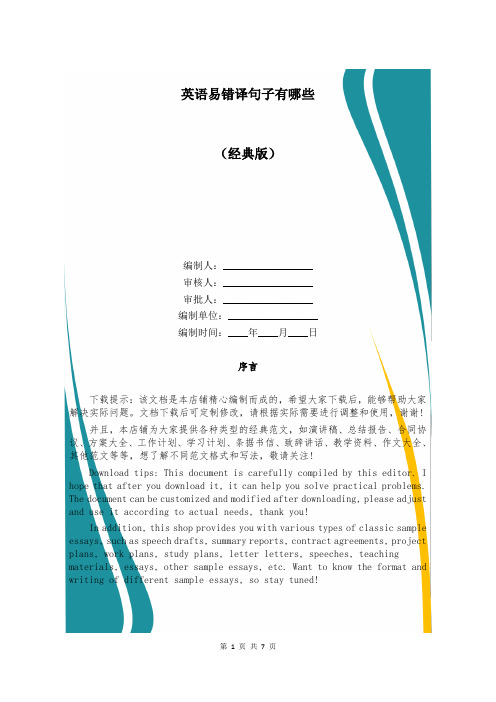
英语易错译句子有哪些(经典版)编制人:__________________审核人:__________________审批人:__________________编制单位:__________________编制时间:____年____月____日序言下载提示:该文档是本店铺精心编制而成的,希望大家下载后,能够帮助大家解决实际问题。
文档下载后可定制修改,请根据实际需要进行调整和使用,谢谢!并且,本店铺为大家提供各种类型的经典范文,如演讲稿、总结报告、合同协议、方案大全、工作计划、学习计划、条据书信、致辞讲话、教学资料、作文大全、其他范文等等,想了解不同范文格式和写法,敬请关注!Download tips: This document is carefully compiled by this editor. I hope that after you download it, it can help you solve practical problems. The document can be customized and modified after downloading, please adjust and use it according to actual needs, thank you!In addition, this shop provides you with various types of classic sample essays, such as speech drafts, summary reports, contract agreements, project plans, work plans, study plans, letter letters, speeches, teaching materials, essays, other sample essays, etc. Want to know the format and writing of different sample essays, so stay tuned!英语易错译句子有哪些高考英语试题中的六大考题都涉及到对句子的理解。
30句日常最容易说错的英语,帮你纠正好了!
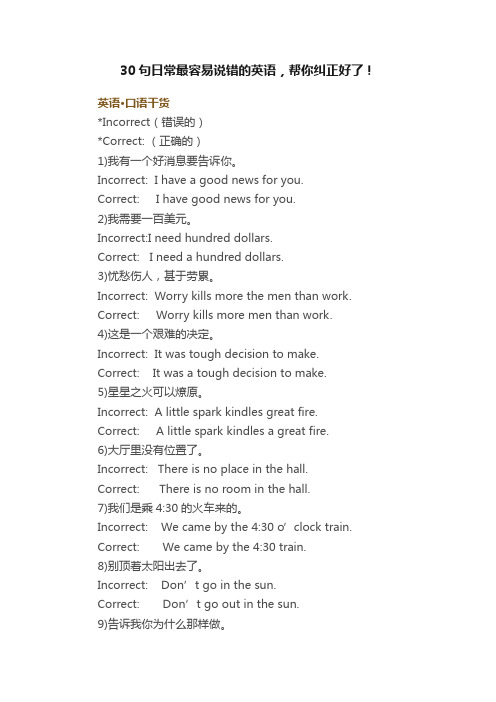
30句日常最容易说错的英语,帮你纠正好了!英语·口语干货*Incorrect(错误的)*Correct: (正确的)1)我有一个好消息要告诉你。
Incorrect: I have a good news for you. Correct: I have good news for you.2)我需要一百美元。
Incorrect:I need hundred dollars.Correct: I need a hundred dollars.3)忧愁伤人,甚于劳累。
Incorrect: Worry kills more the men than work. Correct: Worry kills more men than work.4)这是一个艰难的决定。
Incorrect: It was tough decision to make. Correct: It was a tough decision to make.5)星星之火可以燎原。
Incorrect: A little spark kindles great fire. Correct: A little spark kindles a great fire.6)大厅里没有位置了。
Incorrect: There is no place in the hall. Correct: There is no room in the hall.7)我们是乘4:30的火车来的。
Incorrect: We came by the 4:30 o’clock train. Correct: We came by the 4:30 train.8)别顶着太阳出去了。
Incorrect: Don’t go in the sun.Correct: Don’t go out in the sun.9)告诉我你为什么那样做。
Incorrect: Tell me why did you do that ?Correct: Tell me why you did that.10)我会和你跟他一起做。
(完整版)英语翻译易错语句

(完整版)英语翻译易错语句1. Nobody will be the wiser.谁也不会更为聪明。
(误)谁也不懂得。
(正)注:英语形容词wise 有三个基本意思:(1) 聪明的,如You were wise not to go.(你不去是聪明的)。
(2) 饱学的,如He is wise in the law.(他精通法律)。
(3)知道的,如We are none the wiser for his explanations.(听完他的解释,我们还是不明白)。
上例便是第三义,等于说Nobody will know it. 通常比较级,意为“至今不知道的事,现在知道了”,所谓none the wiser= no wiser than before= as wise as before,照旧。
2.Don't you see the writing on the wall?你看不见墙上的字吗?(误)难道你看不到灾难的迫切吗?(正)注:The writing on the wall (or sometimes 'handwriting on the wall') is an expression that suggests a portent of doom or misfortune. It originates in the Biblical book of Daniel - where supernatural writing fortells the demise of the Babylonian Empire, but it has come to have a wide usage in language and literature.3.Truth lies at the bottom of the decanter.真相从玻璃酒瓶地下看出来。
(误)酒后吐真言。
(正)4.Don't tell him home truths.不要告诉他家里的真相。
中国人最易错的20局英语

中国人常说错的20句英语1. 我很喜欢。
错误:I very like it正确:I like it very much.2. 这个价格对我挺合适的。
错误:The price is very suitable for me.正确:The price is right.Note:suitable (合适的、相配的)最常见的用法是以否定的形式出现在告示或通知上,如:下列节目儿童不宜。
The following programme is not suitable for children在这组句子中用后面的说法会更合适。
3. 你是做什么工作的呢?错误:What’s your job?正确:Are you working at the moment?Note:what’s your job这种说法难道也有毛病吗?是的。
因为如果您的谈话对象刚刚失业,如此直接的问法会让对方有失面子,所以您要问:目前您是在上班吗?Are you working at the moment?接下来您才问:目前您在哪儿工作呢?Where are you working these days?或者您从事哪个行业呢?What line of work are you in? 顺带说一下,回答这类问题时不妨说得具体一点,不要只是说经理或者秘书。
4. 用英语(论坛)怎么说?错误:How to say?正确:How do you say this in English?Note:How to say是在中国最为泛滥成灾的中国式英语之一,这决不是地道的英语说法。
同样的句子有:请问这个词如何拼写?How do you spell that please?请问这个单词怎么读?How do you pronounce this word?5. 明天我有事情要做。
错误:I have something to do tomorrow?正确:Sorry but I am tied up all day tomorrow.用I have something to do来表示您很忙,这也完全是中国式的说法。
- 1、下载文档前请自行甄别文档内容的完整性,平台不提供额外的编辑、内容补充、找答案等附加服务。
- 2、"仅部分预览"的文档,不可在线预览部分如存在完整性等问题,可反馈申请退款(可完整预览的文档不适用该条件!)。
- 3、如文档侵犯您的权益,请联系客服反馈,我们会尽快为您处理(人工客服工作时间:9:00-18:30)。
盘点平常用英文容易翻译错的25个句子1. 你是做什么工作的呢?False: What’s your job?True: Are you working at the moment?what’s your job这种说法难道也有毛病吗?是的。
因为如果您的谈话对象刚刚失业,如此直接的问法会让对方有失面子,所以您要问:目前您是在上班吗,Are you working at the moment,接下来您才问:目前您在哪儿工作呢,where are you working these days,或者您从事哪个行业呢,What line of work are you in,顺带说一下,回答这类问题时不妨说得具体一点,不要只是说经理或者秘书。
2. 我很喜欢它。
False: I very like it.True: I like it very much.3 这个价格对我挺合适的。
False: The price is very suitable for me.True: The price is right.suitable(合适的、相配的)最常见的用法是以否定的形式出现在告示或通知上,如:下列节目儿童不宜。
The following programme is not suitable for children在这组句子中用后面的说法会更合适。
4. 用英语怎么说?False: How to say in English?True: How do you say this in English?How to say是在中国最为泛滥成灾的中国式英语之一,这决不是地道的英语说法。
同样的句子有:请问这个词如何拼写,How do you spell that please,请问这个单词怎么读,How do you pronounce this word。
5. 明天我有事情要做。
False: I have something to do tomorrow.True: Sorry but I am tied up all day tomorrow.用I have something to do来表示您很忙,这也完全是中国式的说法。
因为每时每刻我们都有事情要做,躺在那里睡大觉也是事情。
所以您可以说我很忙,脱不开身:I’m tied up.还有其他的说法:I’m afraid I can’t make it at that time. I,d love to, but I can’t,I have to stay at home.6. 我没有英文名。
False: I haven’t English name.True: I don’t have an English name.许多人讲英语犯这样的错误,从语法角度来分析,可能是语法功底欠缺,因为have在这里是实义动词,而并不是在现在完成时里面那个没有意义的助动词。
所以,这句话由肯定句变成否定句要加助动词。
明白道理是一回事,习惯是另一回事,请您再说几话:我没有钱;I don’t have any money.我没有兄弟姐妹;I don’t have any brothers or sisters.我没有车。
I don’t have a car.7. 我想我不行。
False: I think I can’t.True: I don’t think I can.这一组然是个习惯问题,在语法上称为否定前置,这就是汉语里面说“我想我不会”的时候,英语里面总是说“我不认为我会”。
以后您在说类似的英语句子的时候,只要您留心,也会习惯英语的说法的。
8. 我的舞也跳得不好。
False: I don’t dance well too.True: I am not a very good dancer either.当我们说不擅长做什么事情的时候,英语里面通常用not good at something,英语的思维甚至直接踊跃到:我不是一个好的舞者。
9. 现在几点钟了?False: What time is it now?True: What time is it, please?What time is it now这是一个直接从汉语翻译过的句子,讲英语的时候没有必要说now,因为您不可能问what time was it yesterday或者what time is it tommorow。
所以符合英语习惯的说法是:请问现在几点了?还有一种说法是:how are we doing for time 这句话在有时间限制的时候特别合适10. 我的英语很糟糕。
False: My English is poor.True: I am not 100% fluent, but at least I am improving.有人开玩笑说,全中国人最擅长的一句英文是:My English is poor实话说,我从来没有遇到一个美国人对我说:My Chinese is poor。
无论他们的汉语是好是坏,他们会说: I am still having a few problem, but I'm getting better。
当您告诉外国人,您的英语很poor,so what(那又怎么样呢) 是要让别人当场施舍给我们一些英语呢,还是说我的英语不好,咱们不谈了吧。
另外一个更大的弊端是,一边不停的学英语,一边不停地说自己的英语很poor,这正像有个人一边给车胎充气,又一边在车胎上扎孔放气。
我坚信,如果现在就苦下功夫,把EPTIP系列教材吃通吃透,您的IT职业英语水平立即就会迅速的提高。
您以后和外国IT同行交流时再也不用说:我的英语很poor。
您可以实事求事地说,我的英语还不算十分流利,但至少我在进步。
11. 你愿意参加我们的晚会吗?False:Would you like to join our party on Friday?True: Would you like to come to our party on Friday night?join往往是指参加俱乐部或者协会,如:join a health club; join the Communist Party。
事实上,常常与party搭配的动词的come 或者go。
如go a wild party,或者come toa Christmas Party。
12. 我没有经验。
False:I have no experience.True: I am afraid I don’t know much about that.I have no experience这句话听起来古里古怪,因为您只需要说:那方面我懂得不多,或者这方面我不在行,就行了。
I am not really an expert in this area.13. 我没有男朋友。
False: I have no boyfriend.True: I don’t have a boyfriend.14. 他的身体很健康。
False: His body is healthy.True: He is in goo d health.You can also say: He’s healthy.15. 价钱很昂贵/便宜。
False: The price is too expensive/cheap.True: The price is too high/ rather low.16. 我们下了车。
False: We got off the car.True: We got out of the car.17. 车速快了。
False: The speed of the car is fast.True: The car is speeding. Or “The car is going too fast.”18. 这个春节你回家吗?Will you be going back home for the Spring Festival?False: 是的,我回去。
Of course! (这一句是错的)True: 当然。
Sure. / Certainly.(这种说法是正确的)以英语为母语的人使用of course的频率要比中国的学生低得多,只有在回答一些众所周知的问题时才说of course。
因为of course后面隐含的一句话是“当然我知道啦!难道我是一个傻瓜吗?”因此,of course带有挑衅的意味。
在交谈时,用sure或certainly效果会好得多。
同时,of course not也具挑衅的意味。
正常情况下语气温和的说法是certainly not。
19. 我觉得右手很疼。
False:I feel very painful in my right hand.True: My right hand is very painful.Or "My right hand hurts(aches)."20. 他看到她很惊讶。
False: He looked at her and felt surprised.True: He looked at her in surprise.21. 我读过你的小说但是没料到你这么年轻。
False: I have read your novels but I didn't think you could be so young. True: After having read your novel,I expected you would be older.22. 她脸红了,让我看穿了她的心思。
False:Her red face made me see through her mind.True: Her red face told me what she was thinking.23. 看到这幅画让我想到了我的童年时代。
False:The sight of these pictures made me remember my own childhood. True: Seeing these pictures reminded me of my own childhood.24. 别理她。
False: Don't pay attention to her.True: Leave her alone.25. 我在大学里学到了许多知识。
False: I get a lot of knowledge in the university.True: I learned a lot in universit.。
